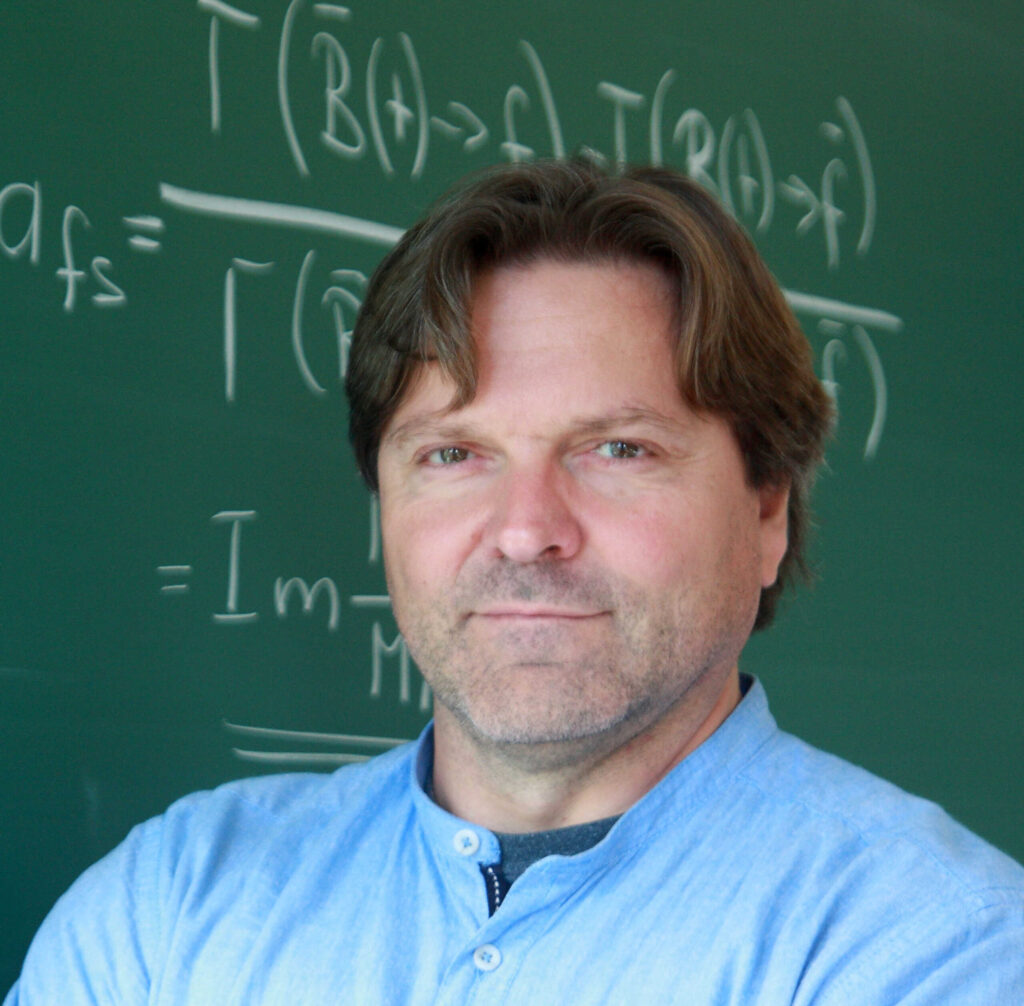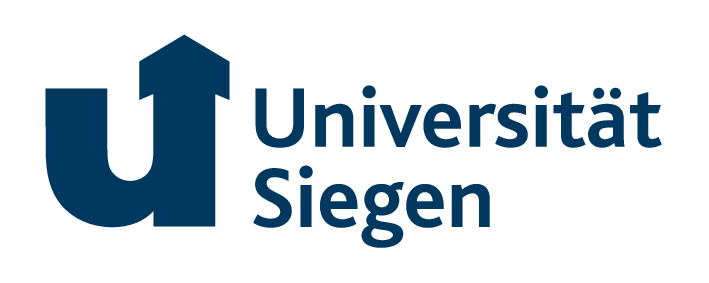
- After studying physics at Technical University of Munich, I did my PhD at the Max-Planck-Institut for physics (Werner Heisenberg Institute) in Munich under the supervision of Uli Nierste and Andrzej Buras. I was working at that time on higher order QCD corrections to inclusive B meson decays.
- In 1999 I switched to the chair of Vladimir Braun at Regensburg University and I started to work also on sum rules as well as different new physics models (in particular SUSY and 4th generation) – 6 years later I did my habilitation in Regensburg. In 2005 I received the Prize for excellent Teaching from the Bavarian government.
- From 2010 on I had temporary professorships in Regensburg (W2), TU Dortmund (W2) and TU Munich (W3).
- End of 2011 I started a Heisenberg-fellowship at CERN, which I quit after only one year to start as a lecturer at Durham University, UK.
- During my eight years in Durham I was promoted to Senior Lecturer, Reader and Professor and for a little more than five years I was deputy director of the IPPP. In that time I was organising a big number of workshops mostly dedicated to flavour physics in the UK (e.g. the legendary Heavy Flavour workshop in the Ardbeg Distillery – see the Ardbeg Committee Newsletter ) and I initiated an outreach program for the IPPP, which reached more than 50 000 people. I acted for several years as external examiner of the physics department of Warwick University, being responsible for the content of examination papers and for marking standards in the same way as for all other UK physics students. Physicswise I started in the UK to investigate the potential size of BSM effects in non-leptonic tree-level decays and the use of HQET sum rules to determine Bag parameters for mixing and lifetimes.
- In June 2020 I moved back to Germany and I have conquered the chair of theoretical particle physics at the University of Siegen from Thomas Mannel. I am still teaching regularly at Cambridge University and at international schools for PhD students (e.g. Japanese PhD meeting, LHCb School Neckarzimmern, Wai-Hai Summer School in China, Maria Laach, pre-FPCP School in Lyon, CERN School in Denmark). A brief summary of the activities at our chair from 2022 here and 2024 here.
- In May 2025 our excellence cluster project Color meets Flavor with our friends in Bonn, Dortmund and Jülich has been accepted by DFG, which received a lot of media attention. We bring together leading experts from separate fields like hadron and flavour physics (both from experiment and theory) in order to solve puzzles, like structure formation in QCD, the origin of the B anomalies or the missing amount of CP violation in nature. We are successfully collaborating with our friends from Aachen, Karlsruhe and Heidelberg for several years in the collaborative research center CRC TRR-257, working on particle physics phenomenology after the Higgs discovery.
Social Media: YouTube, Instagram , TikTok, Twitter , facebook — Why is physics in Siegen great? — You can also rent me for free! Rent a Prof – even for primary schools! — Podcast at Siegen University and within our CRC
Publications
A list of my publications can be found in the inSpire database by clicking here or at GoogleScholar
Research Interests and Research Areas
I am basically interested in finding the correct extension of the standard model that will also allow to explain the existence of matter in the universe as well as the nature of dark matter. To come closer to the solution of this ambitious goal numerous small steps have to be undertaken. First real deviations of experiment and standard model have to be identified. Therefore we need control over the hadronic uncertainties of the theory predictions. Then the theoretical structure of possible deviations has to be investigated – this can be done in a model-dependent and a model-independent way. Finally cosmological consequences of modification of the standard model have to be studied.
- Precise standard model predictions for flavour observables – most precise predictions for mixing and lifetimes (Reference value for HFLAV) – Interview for Nature about CP violation
- Theoretical understanding of Charm Physics (Nature article, Interview for Physics World, Cern Courier article on the 50th anniversary of the discovery of the charm quark)
- Indirect new physics searches and new physics contributions to non-leptonic B decays
- New physics models (SUSY, 4th Generation, 2HDM)
- Flavour bounds for Dark matter model

Selected Talks (12 out of 300)
- Flavour Physics over the Course of Time – Final Keynote Talk at LHCb Implications at CERN (October 2022)
- Theoretical Aspects of Mixing and CP violation – Plenary Talk at Lepton-Photon 2022 in Manchester (January 2022)
- Per Aspera ad Astra – Antrittsvorlesung in Siegen (December 2021)
- Charm physics at a super tau charm factory – Talk in Novosibirsk (November 2021)
- Per Aspera ad Astra – Talk in Cambridge (November 2019)
- Quark Hadron Duality – Talk in Primosten (October 2019)
- Status of mixing and lifetimes – Seminar in Liverpool (May 2018)
- Flavour Physics in the LHC era – Plenary talk at PHENO 2017 in Pittsburgh (May 2017)
- Flavour Physics @ IPPP – Durham (March 2017)
- Charm theory – Opening talk of CHARM 2016 in Bologna (September 2016)
- Flavour Physics – Quo vadis? – Talk for a successful job-interview (January 2014)
- How to really kill a model of NP – Seminar in Bern (May 2012)
Conference Organisation since 2022
- Herbstschule 2024 – Bad Honnef, 3.-13.9.2024
- Quirks in Quark Flavour Physics – Zadar, Croatia, 17.-21.6.2024
- Beyond the flavour anomalies – Siegen, 9.-11.4.2024
- Color meet Flavour PhD School – Bad Honnef, 18.-22.3.2024
- Herbstschule Maria Laach 2023 – Maria Laach, 5.-15.9.2023
- CHARM 2023 – Siegen, 17.-21.7.2023
- Heavy Flavour 2023 – Quo vadis? – Ardbeg Distillery, Islay, Scotland, 19.-23.6.2023
- Quirks in Quark Flavour Physics – Zadar, Croatia, 14.-17.6.2022
- Status and Prospects of non-leptonic B meson decays – Siegen, 30.5.-2.6.2022
Teaching (selected lecture notes)

- Theoretische Quantenmechanik, Siegen 2023/24
- Theoretische Mechanik, Siegen 2022/23
- Youtube Video of Revision Lecture for Foundations of Physics
- Lecture Notes for Foundations of Physics 1 (Mechanics 2), Durham
- Lecture Notes for Cosmology, Durham
- Lecture about Charm Physics in Wei Hai, China
- Lecture notes for Flavour Physics, Cambridge, Durham
- Lecture notes for Theoretical Physics 3, Durham
PhD students

- Ali Mohamed (Siegen, 2023 – now) 1 paper with me
- Zachary Wüthrich (Siegen, 2022 – now) 2 papers with me
- Matthew Black (Siegen, 2021 – 2024, post-doc in Edinburgh), 4 papers with me
- Di Wang (Durham/Lanzhou University, 2019-20)
- Christos Vlahos (Durham, 2017-2022, now in industry), 2 papers with me; Thesis
- Daniel King (Durham, 2017-2022, now in industry), 4 papers with me; Thesis
Daniel received the St.Cuthbert’s Society Postgraduate Prize for outstanding academic achievement. - Maria Laura Piscopo (Durham/Siegen, 2017-21, post-doc in Siegen), 9 papers with me; Thesis
Maria Laura received the International PhD Prize of Siegen University and the Walter-Benjamin fellowship from DFG - Matthew Kirk (Durham, 2014-18, post-doc in Rome and Barcelona), 9 papers with me; Thesis
Matthew received the Springer Thesis Prize - Thomas Jubb (Durham, 2015-17, now private sector), 2 papers with me; Thesis
- Gilberto Tetlalmatzi-Xolozcotzi (Durham, 2012-16, post-doc at NIKHEF, Siegen and Orsay), 5 papers with me; Thesis
Gilberto received a STAR fellowship from Siegen University to work at Orsay
Flavour Postdocs
- Martin Lang (Siegen, Start 2023)
- Meryl Reboud (Siegen, 2023-24, now permanent in Orsay)
- Maria Laura Piscopo (Siegen, 2021-24, now post-doc in NIKHEF)
- Oliver Witzel (Siegen, Start 2020)
- Aleksey Rusov (Durham and Siegen, 2018-24, now post-doc at TUM)
- Thomas Rauh (Durham, 2016-18, post-doc in Bern, now in private sector)
- Martin Wiebusch (Durham, 2013-15, now private sector)
Outreach

- Brochure about the research topics of the subatomic heroes
- Physik im Apollo – Gravity at the Apollo theatre in Siegen in July 2023
- 10th anniversary of Higgs discovery – John Ellis at Siegen University in July 2022
- Clash of Sciences – Physics vs. Chemistry – 50th anniversary of Siegen University in May 2022
- Studientag Physik – Siegen University, February 2022
- Modelling the Invisible – Public talk at the Orkney Science Festival 2018
- IPPP @ Royal Society Summer Science Exhibition 2017: Modelling the Invisible – have also a look at our outreach brochure or the corresponding presentation
- What is the smallest thing in the Universe? – Lecture for Year 5 and Year 6 pupils of St. Godrics Primary School, Durham
- The Royal Ballett meets IPPP
- Why does the Universe exist? – Lecture for 6th form students at Charterhouse (Surrey), Framwellgate School (Durham) and Cardinal Hume School (Gateshead)
- What’s the point of theoretical physics? – Article for The Conversation, see also the original draft.
- Why spend billions on a particle accelerator? – Talk at A Pint of Science 2017, Durham
What does a physics professor do in his spare time?

I spend a lot of time in supporting my family and my friends.
Besides my professional interest in theoretical particle physics I am also keen on applied research, in particular on subtle effects of the General Theory of Relativity on different test particles in the gravity field of the Earth. In that respect I regularly participate in expert meetings on applied gravity, see also here.
In contrast to most of my physics colleagues, I highly respect other sciences like chemistry – I regularly travel with like-minded people far in order to be able to study and appreciate the outcome of chemical investigations at remote research laboratories.
Click here to get a more exciting version with pictures or check how BBC is presenting me.


